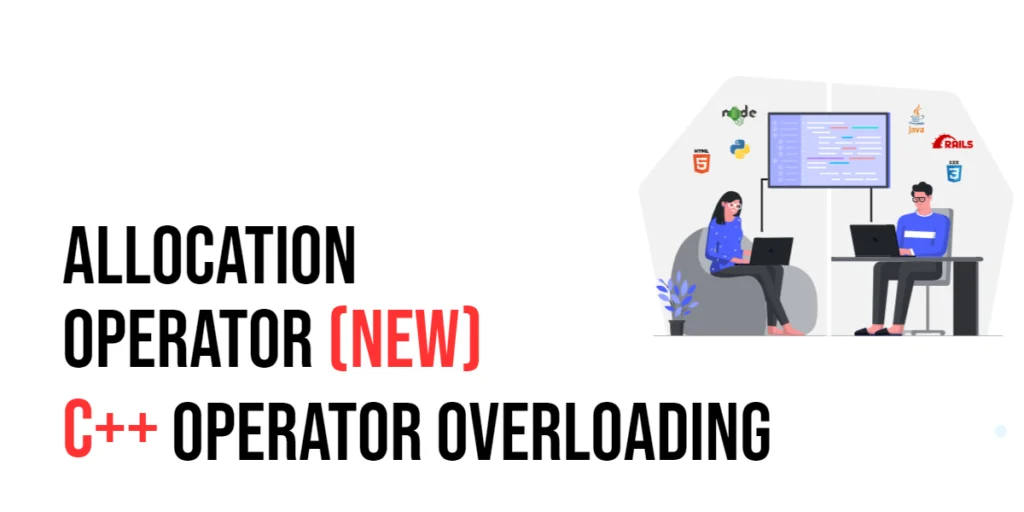In C++, operator overloading lets programmers customize how operators behave with their own types, making code easier to read and maintain. In this article, we’re diving deep into a particularly tricky part of operator overloading: the allocation operator new. This is especially important for developers who want precise control over how memory is used in their programs. By understanding and using the new operator effectively, developers can manage memory more efficiently and tackle complex programming challenges with confidence.

with hands-on learning.
get the skills and confidence to land your next move.
What is Operator Overloading?
Operator overloading is a feature in C++ that allows programmers to redefine how standard operations work with their custom types. Think of it like teaching old tricks to new dogs. For instance, you can use the + operator to combine two objects from a class you’ve designed, or use << to display an object’s details on your screen. These capabilities make your code not only easier to write but also more intuitive to read, much like speaking in a more natural, human-like language in your code.
Understanding new and delete
In C++, when your program needs to remember information or store data as it runs, you use dynamic memory allocation. This is managed by two special operators: new and delete.
The new operator serves a crucial role. When you need to create an object or a whole array of objects, new finds a spot in the computer’s memory (specifically in an area called the heap) large enough to hold the object(s) and prepares it for use. This spot in memory is reserved until you decide it’s no longer needed. The operator then hands back a pointer, which is essentially a direct address, pointing to the start of this memory block.
On the flip side, the delete operator takes over when these objects are no longer needed. It ensures that the memory which was previously allocated is now freed up, making space available again for future use. This process of allocation and deallocation is vital for managing resources in a C++ program, preventing what is known as memory leaks—where memory gets filled with unused data, slowing down or even crashing your program.
By understanding and controlling these operators, you can ensure your applications run efficiently and manage resources wisely, which is especially crucial in software that requires fast and efficient performance.
Customizing Memory Allocation with the new Operator in C++
Overloading the new operator in C++ is a powerful tool that allows you to take control of how memory is allocated for your objects. This capability is particularly valuable for various advanced programming tasks such as debugging, managing memory in custom ways through memory pools, and monitoring how objects are allocated during the program’s runtime.
How to Overload the new Operator
Let’s look at a straightforward example to understand how you can overload the new operator for a custom class.
#include <iostream>
#include <cstdlib>
class MyClass {
public:
// Overloaded new operator
void* operator new(size_t size) {
std::cout << "Custom new for MyClass of size " << size << std::endl;
void* storage = malloc(size);
if (storage == nullptr) {
throw std::bad_alloc(); // Handle memory allocation failure
}
return storage;
}
// Overloaded delete operator
void operator delete(void* ptr) {
std::cout << "Custom delete for MyClass" << std::endl;
free(ptr);
}
};
int main() {
MyClass* obj = new MyClass; // Using the custom new operator
delete obj; // Using the custom delete operator
return 0;
}Breaking down the code:
- Overloading new: In the class MyClass, we define the operator new as a static method. It accepts a parameter size_t size, which is automatically provided by C++ and represents the size of the object that needs to be allocated. This method uses malloc to allocate memory. If malloc fails (returns nullptr), we throw a std::bad_alloc exception to signal the allocation failure.
- Overloading delete: To balance our custom new, we also provide a custom delete. This ensures any memory allocated with our custom new is properly freed, avoiding memory leaks. The operator delete method uses free to deallocate the memory pointed to by ptr.
Why Overload new and delete?
Overloading these operators can enhance your program in several ways:
- Debugging: By inserting custom messages or logging in these operators, you can track exactly when and where your memory allocations and deallocations happen, helping you spot leaks or misuse of memory.
- Performance: Custom memory allocation strategies, like memory pools, can significantly speed up allocation and deallocation, especially important in performance-critical applications.
- Safety: Overloading allows incorporating additional checks and balances around memory management, potentially making your applications more robust against crashes due to memory issues.
Overloading the new and delete operators gives you an additional level of control over your C++ applications, enabling more efficient and safe handling of dynamic memory. While powerful, it’s essential to use these features wisely to avoid complicating your codebase unnecessarily. Make sure you thoroughly test any custom memory management logic to ensure it behaves as expected.
Advanced Example: Customizing Memory Management for Arrays
In C++, when you need to allocate memory for an array of objects, the operators new[] and delete[] come into play. They handle the creation and destruction of multiple instances. Let’s see how we can take control of these operations by overloading these operators to better understand and manage how our arrays are allocated and deallocated.
Here’s a straightforward example of how to do this:
#include <iostream>
#include <cstdlib>
#include <new> // Needed for std::bad_alloc
class MyClass {
public:
// Overloading the new[] operator
void* operator new[](size_t size) {
std::cout << "Custom new[] for MyClass of size " << size << std::endl;
void* storage = malloc(size);
if (storage == nullptr) {
// If memory cannot be allocated, throw an exception
throw std::bad_alloc();
}
return storage;
}
// Overloading the delete[] operator
void operator delete[](void* ptr) {
std::cout << "Custom delete[] for MyClass" << std::endl;
free(ptr); // Free the allocated memory
}
};
int main() {
// Creating an array of 5 MyClass objects
MyClass* objs = new MyClass[5]; // This calls our custom new[]
// When done, delete the array
delete[] objs; // This calls our custom delete[]
return 0;
}Breaking down the code:
- Custom new[] Operator: This method is triggered when we try to allocate an array of MyClass objects. The size parameter tells us the total amount of memory needed for the array. We attempt to allocate this using malloc. If successful, we return the pointer to the allocated memory block; if not, we throw an exception to indicate the failure.
- Custom delete[] Operator: Correspondingly, this method handles the deallocation of memory that was previously allocated for an array of MyClass objects. We simply free the memory pointed to by ptr and print a message to indicate this action.
Why Overload new[] and delete[]?
Overloading these operators can be particularly useful in scenarios where you need to:
- Track Memory Usage: By customizing these operators, you can add logging to monitor when and how much memory is being allocated and freed. This is immensely helpful for debugging and optimizing memory usage.
- Implement Custom Memory Pools: In performance-critical applications, you might want to use a pool of pre-allocated memory to speed up allocation and deallocation operations.
- Enhance Stability: Proper handling of memory allocation failures by throwing exceptions can prevent undefined behaviors and crashes in low-memory situations.
By taking control of array memory management in C++, you not only gain deeper insight into how your applications handle resources but also enhance their performance and reliability. This approach, however, requires careful handling to avoid common pitfalls such as memory leaks and mismatched use of custom new[] and delete[].
Best Practices and Key Considerations
When venturing into the territory of overloading the new and delete operators in C++, there are a few best practices and considerations to keep in mind to ensure your code is both effective and robust:
- Consistency is Key: It’s essential to maintain consistency in how memory is managed. If you decide to overload the new operator for a class, it’s wise to also overload the delete operator. This approach ensures that every byte of memory allocated is also properly freed, maintaining a balanced system and preventing memory leaks.
- Handle Exceptions Gracefully: Memory allocation can fail due to various reasons, such as system resource limitations. Therefore, incorporating robust exception handling in your custom new operator is crucial. This means checking if memory allocation was successful and, if not, throwing an appropriate exception to signal that something went wrong. This proactive error management helps prevent your program from crashing unexpectedly.
- Use Debugging to Your Advantage: Overloading memory management operators can be a double-edged sword; while it gives you control, it also adds complexity. You can turn this to your advantage by embedding logging within these operators. By tracking memory allocations and deallocations, you can monitor the flow of memory usage throughout your program, making it easier to identify and fix leaks or other issues.
Conclusion
Overloading the new and delete operators in C++ hands developers the reins of memory management, allowing for tailored handling that can boost performance and efficiency, especially in applications where resource management is critical. This capability is powerful but comes with the responsibility to use it wisely to avoid introducing hard-to-track bugs.
By mastering these advanced features, C++ programmers not only enhance the stability and efficiency of their applications but also deepen their understanding of how C++ manages memory. This deeper insight can lead to writing cleaner, more efficient code that fully leverages the nuanced capabilities of the language.







